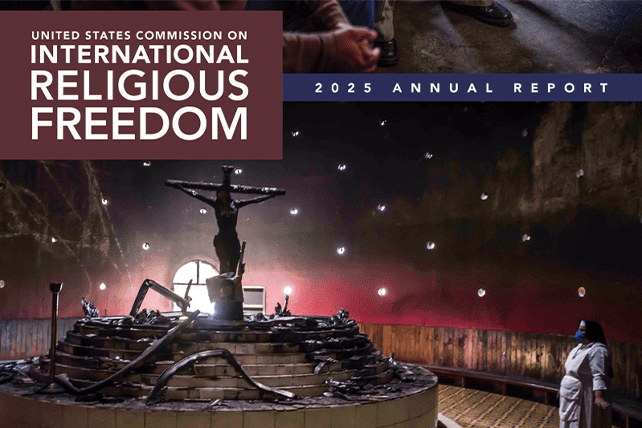USCIRF also sought these countries to be added to the special watch list: Egypt, Indonesia, Iraq, Kazakhstan, Kyrgyzstan, Malaysia, Sri Lanka, Syria, Turkey and Uzbekistan.
Schneck, who was appointed by President Joe Biden, said the repetition in its requests about countries of particular concern, or CPCs, reflects the troubled state of religious liberty across the globe.
“It’s become much worse in several places, including Iran, Nicaragua and, frankly, Russia,” he said, adding that key drivers are often authoritarian governments like those, and religious nationalism in countries such as Myanmar (which the report called Burma), India and Turkey. “We’re not seeing progress. In fact, in most of the countries on this list, we’re seeing regress.”
For the second year in a row, the commission also requested that the presidential administration appoint an envoy for Nigeria and the Lake Chad region, as northern portions of Nigeria have seen violence against Christians as well as Muslims.
Schneck said he was disappointed that the State Department did not, as expected, announce its latest designations for its lists of religious liberty violators before the conclusion of the Biden administration, nor since the start of the Trump administration.
The report noted the Biden administration’s funding of hundreds of millions of dollars of humanitarian aid through the U.S. Agency for International Development for religious groups facing genocide and persecution, such as Muslim Rohingya refugees located in and around Bangladesh and for the people of Syria. But Schneck said those programs are part of the pausing of USAID funds that has occurred since Trump took office.
“As I understand, all of the freezes are still in place that affect those USAID programs,” Schneck said. “We’re very hopeful that the new administration will act quickly to resolve some of these situations, so that some really needed programs to protect religious freedom on the ground in different parts of the world can be funded appropriately,” he said.
Likewise, Schneck said the commission is worried about the plight of refugees whose temporary status in the U.S. is in jeopardy due to recent administration decisions.
“We are concerned about anything that makes it more difficult for refugees to flee from religious persecution to find safe haven,” he said.
In its new report, USCIRF requested its own permanent reauthorization as well as that of the bipartisan Lautenberg Amendment that provides a legal process to resettle religious minorities from Iran and countries in the former Soviet Union.
The commission’s report also includes examples of people who have held to their religious beliefs even amid antisemitism, Islamophobia and other forms of religious hostility.
“One of the most heartening things that we see around the world is the resilience of people to stand up for their faith or their lack of faith, for that matter, their principles,” Schneck said, pointing to young people in Iran and congregants in churches in authoritarian countries. “But the larger picture doesn’t change. We are concerned about what looks like a decaying picture for freedom of religion.”
This article originally appeared here.

